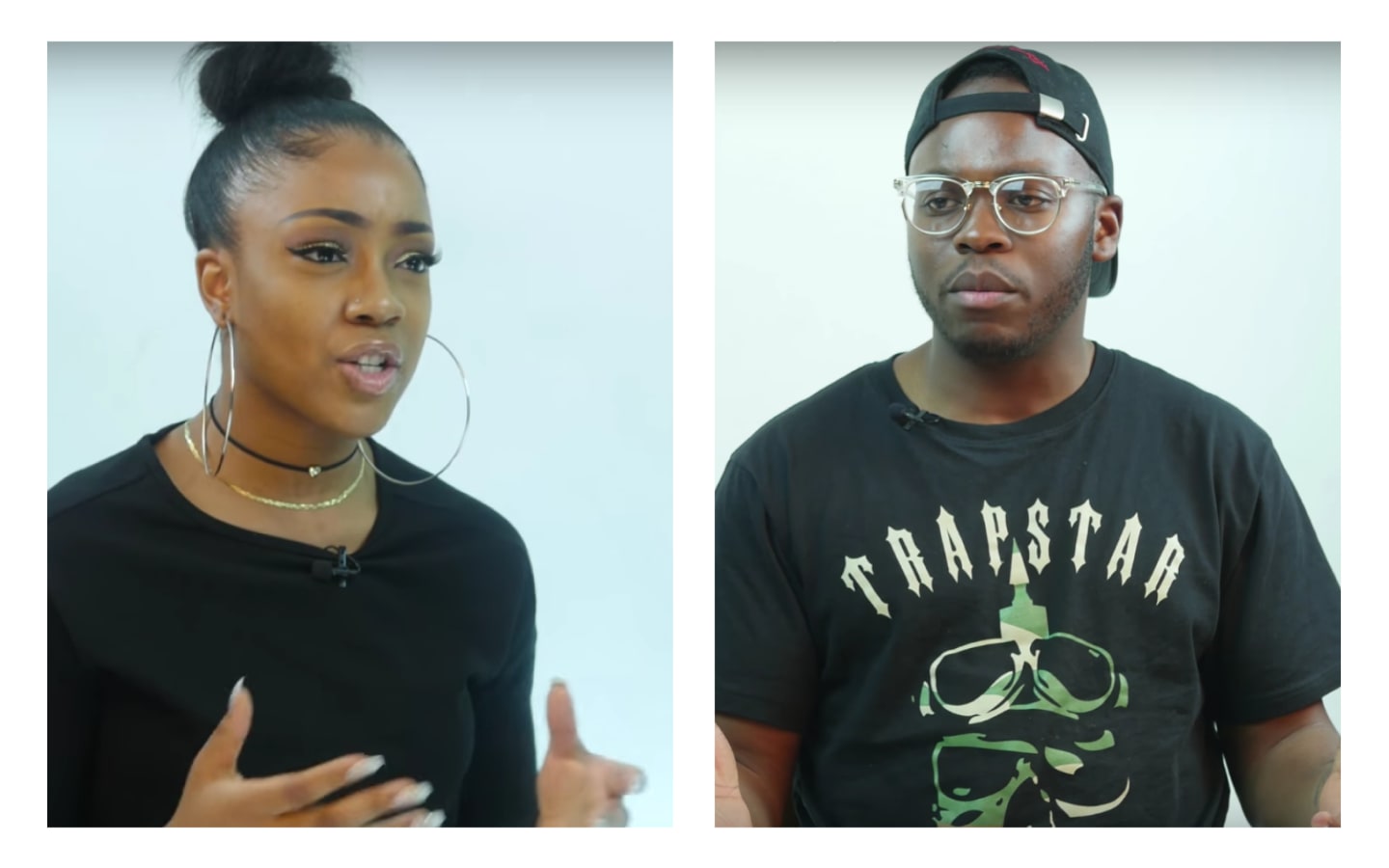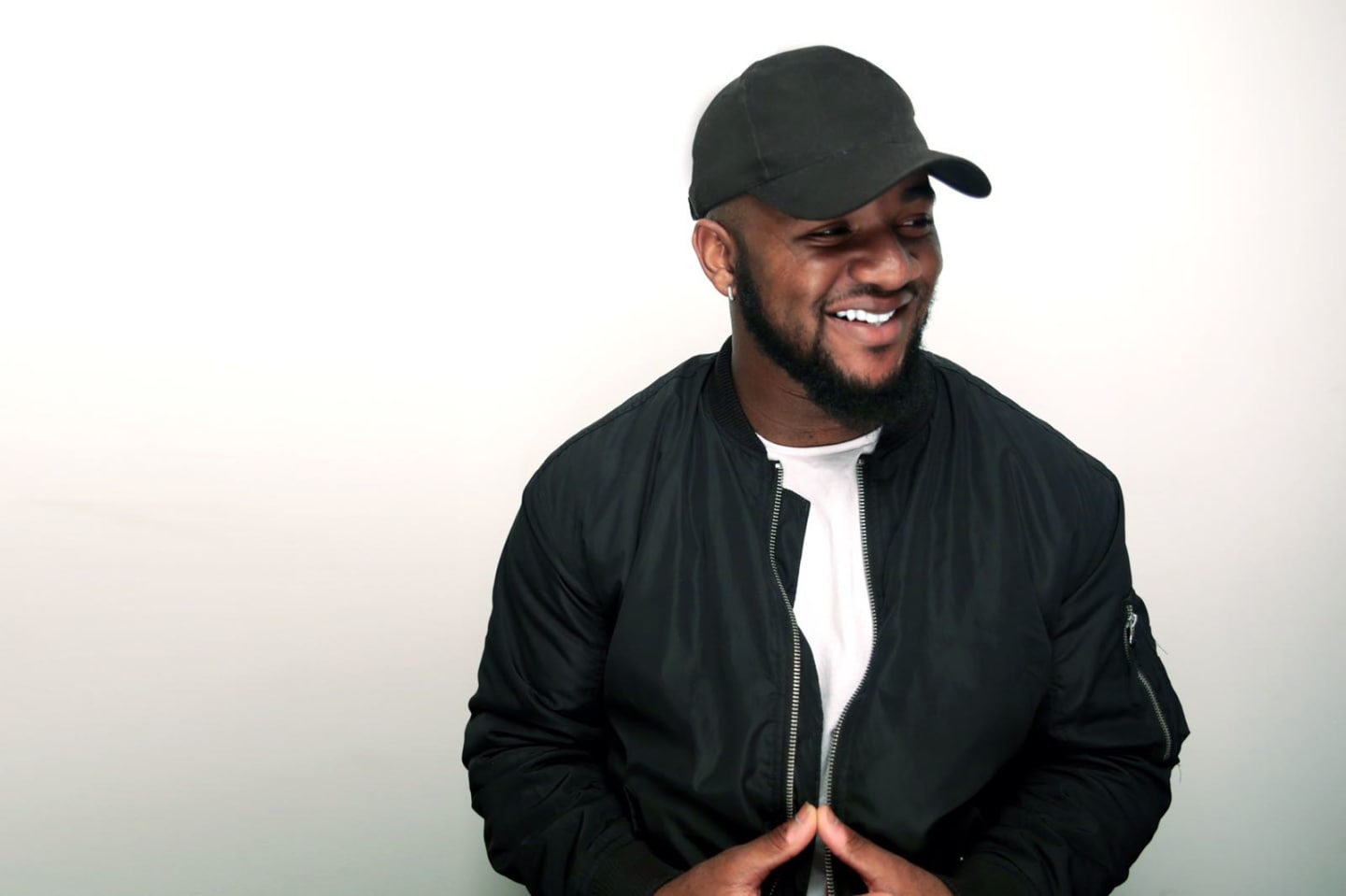 Chioma Ibe in episode eight and Ayo Matthews in episode six of BK Chat London
YouTube
Chioma Ibe in episode eight and Ayo Matthews in episode six of BK Chat London
YouTube
“We don’t have enough TV that represents [black British people],” said Andy Amadi, the 27-year-old founder of the controversial British web series BK Chat (pronounced “back chat”). “It isn’t because our community has a lack of ideas — it’s because there’s a lack of funding.” Amadi’s own show, launched in November 2016, is a laid-back and modern spin on the traditional chat show format. Each week, a group of (mostly black) men and women in their 20s gather in a kitchen to have brutally honest debates on everything from jealousy to body image to racism. With so many strong voices in the room, the discussions rarely stay calm for long. Clearly, there's an appetite for these points of view: the YouTube channel has already amassed over five million views.
BK Chat’s biggest draw is arguably its provocative talking points — like episode four, “Don’t Ask Me How Many People I’ve Slept With!” There’s also the highly opinionated cast members, such as gym fanatic and model Lucas Adeyefa and make-up artist Esther Falana. Occasionally, the show’s tendency to stoke the fires of controversy has led to backlash. BK Chat’s biggest scandal came with episode three, “If I Pay On The First Date, We’re Having Sex,” which divided viewers over issues of sexual consent and rape culture. After a later episode on abortion, one viewer tweeted that the cast had spoken "tactlessly and violently."
In an east London cafe in January, Amadi sipped on a hot chocolate as he explained why he felt the need to create his own show from scratch, after years of working as a director and editor at British television channel BEN TV. The soft-spoken creative said that the reason for BK Chat’s popularity is the same reason people are invested in the Chicken Connoisseur’s YouTube channel — there is simply a lack of content created for the U.K.’s BAME demographic. He spoke to The FADER about his thoughts on the debates surrounding the show, and why the DIY route worked for him.
What do you think is the secret to BK Chat’s success?
There is a real lack of diversity on TV, and that has helped BK Chat spread amongst the under-served urban community. The cast members represent what people are going through today.
Why do you think the show is so divisive?
I think because people on the show all have different opinions, but everyone speaks with no filter. If the cast were sugar-coating things, what would be the point of watching? The opinions have to be honest, whether you like it or not. I think that has driven the show.
Last month, Twitter users unearthed old tweets from former cast member Mimi that demeaned black women. With black women watching and working on the show, do you feel an extra responsibility to tackle misogynoir?
It doesn’t matter who she was talking about. Racism is racism. Whether she [made the comments] a long time ago or yesterday, I feel responsible. I am not trying to feed the same machine we are working against — the lack of diversity and racism in the industry. So I decided to have an episode talking about racism. Racism is still a serious problem and we need to talk about it.
 Andy Amadi, creator of BK Chat London
Zoe Akuoko
Andy Amadi, creator of BK Chat London
Zoe Akuoko
“People want us to act like people we are not. A white man is allowed to be himself, be respected and be successful.”
Speaking of cast members, Lucas and Biskit Abifade are arguably the most controversial. For example, Biskit’s statement in episode three, “I will take you out to a very nice restaurant...I guarantee, that night we are having sex whether you like it or not.” Do you think their behavior has pandered to unfair stereotypes of black men as predatory?
Lucas is probably the most controversial person on the show, and Biskit doesn’t help the situation. I think both of them are exaggerated versions of themselves on the show. The way Lucas has spoken to women, things do get heated — and he has spoken to both men and women in that way. [Lucas speaking aggressively to other men] probably didn’t make the edit. In regards to Biskit and the consent line, I do think the comments were taken out of context. However, I can see why people viewed the comments in that way. I want the show to let people be honest, because we can start conversations, and explain why the comments like that are wrong.
Writer Danielle Dash wrote a piece in the show’s defence, explaining how respectability politics has stopped people accepting BK Chat. Do you agree with that?
Yes, and it is one of the most frustrating things about this show. People want us to act like people we are not. A white man is allowed to be himself, be respected and be successful. This is who we are; this is how we speak. I’ve heard a lot of: “BK Chat doesn’t represent black people correctly.” Well, people do think like that, [but] because you don’t think like that, you don’t want to accept it. I take it really personally when people say, “You don’t represent black people properly.” I’m not fake black. No one on the show is fake black. Most of the people on the panel have degrees, you can’t come and tell us that we should downplay ourselves.
In all honesty, [cast member] Esther Falana is the biggest victim of respectability politics. I have a lot of respect for her. It’s not easy to be yourself in front of camera, especially as a black women. Black women are too scared to be loud, but she doesn’t care. Society has made a lot of black women feel they have to be a certain type person at work or in public. There is no right way to be a black woman, but [being] yourself. Esther is herself.
Do you think people of color have to create their own content in order to be taken seriously by mainstream media companies?
Yes, I do. I’ve tried reaching out and working my way in; it does not work. You can work for the BBC and others, but there are limits. Once you’ve established your own projects and command your own presence, create your own following, you are an asset. You can then come to the table and say, “I want this,” rather than asking, “Can I have this?”
As for black people, the funding usually doesn’t come our way. I don’t think the people in the offices trust people of color with money and that’s not cool. I know that investing my own money and releasing my own material with no middle man has put me in a better position. If talks with established media companies arise, I have the leverage to demand what I deserve. We can [be] DIY and self-fund our projects and trust me, it’s the hard way, but it’s the only way people of color can command authority in the media industry.
What’s next for BK Chat?
To expand into [different geographical] areas. The next series will be BK Chat Essex [county north east of London]. I would also like to see a more diverse range of cast members on BK Chat [London], as I believe other cultures should be represented. London is one of the most diverse cities in the world and it’s important to portray a true reflection of that.